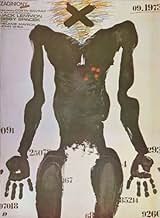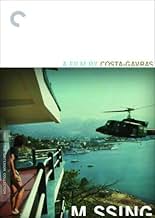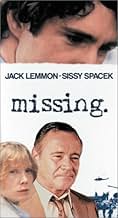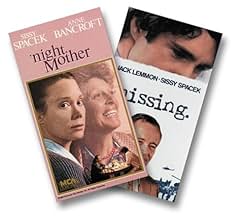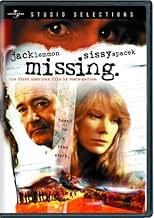When an idealistic American writer disappears during the Chilean coup d'état in September 1973, his wife and father try to find him.When an idealistic American writer disappears during the Chilean coup d'état in September 1973, his wife and father try to find him.When an idealistic American writer disappears during the Chilean coup d'état in September 1973, his wife and father try to find him.
- Won 1 Oscar
- 12 wins & 23 nominations total
- Paris
- (as Martin Lasalle)
Featured reviews
This film won an Oscar for Best Screenplay. It was also nominated for Best Actor (Jack Lemmon), Best Actress (Sissy Spacek) and Best Picture. I am surprised that "Gandhi" won the Best Picture award that year--especially since the film was, in many ways, quite inaccurate historically (I am a history teacher--trust me on this one). "Missing" was a better film--as were "The Verdict", "Tootsie" and "ET" (in my semi-humble opinion). I wonder if perhaps the film's politics doomed it to lose--though considering Hollywood generally DOES run left, this may not be the case.
I am a reasonably conservative American, though I feel ashamed when I see films like "Missing" (as well as Costa-Garvas' other famous film, "Z"). While I am glad that the US had been traditionally anti-communist, this single-minded approach to international communism appears VERY misguided in hindsight. In too many cases, in order to combat this, the US government sponsored repressive and evil regimes--when they should have been pushing for self-determination and freedom. No matter how you try to excuse this, situations like the ones in "Missing" are simply inexcusable and the film should be seen by everyone--not just those on the left politically. Why? Because, the story in this case is TRUE--the situation involving the Pinochet regime in Chile was just plain evil--and should NOT be forgotten or ignored. History should be understood and lessons learned from them...or they'll be repeated. Well worth seeing and very well made overall.
***1/2 (out of four)
Jack Lemmon gives another standout performance (in a career that had many) as the uptight father that learns to accept his son only after his suspected death. The emotional evolution from devout christian/disapproving dad to grieving father with 'opened eyes' is engaging to watch. Sissy Spacek shows the strength that should have won her a second oscar 2001 for "In The Bedroom" as the wife who never stops looking for her husband. But the clear winner in this politcal thriller is the director Costa Gravas, who constantly keeps the politcal tension high, without upstaging the performances of the leads.
A great drama that deal with life/death and the bond between parents and their children.
In his American works,while continuing his militant way,Costa-Gavras puts men and women made of flesh and blood on the screen:Jack Lemmon,who made us laugh so many times in Billy Wilder's masterpieces("some like it hot" "kiss me stupid" "the apartment",the highly underrated "Avanti"),shines in his dramatic part;his portrayal of an all-American man,proud of his country,who cannot really understand the evolution of the new generations but who knows that he's got only one son,whom he might never see again,is mind-boggling:his tired and sad face,always seeming on the verge of tears ,mainly in the second half of the movie which contains two classic scenes:
-The first one takes place in the stadium,where the prisoners are gathered;he's given a mike ,but a lump comes to his throat and he hands it to Sissi Spacek -who plays (with talent) the missing son's wife -;In the giant stadium,no echoes ,even when Lemmon,in a desperate call,asks his son to come home.
-The second one takes place in some kind of morgue,where dead bodies pile up.The wife and the father really go to hell,in this almost unbearable scene.
The Putsch (Costa-Gavras takes the American intervention for granted whereas there's nothing that proves it)takes a back seat to the desperate couple's plight.
Costa-Gavras has not completely forsaken France though:the book Spacek and Shea are reading is none other than Saint-Exupery's "le petit prince".
Did you know
- TriviaDuring the Pinochet dictatorship, which ran from 1973 to 1990, this picture was banned in Chile.
- GoofsWhen Ed Horman is at the State Department trying to get information about Charlie, there is the presidential portrait of Richard Nixon on the wall in the background and a more personal photo of him on Marine One on the credenza behind the desk. That photograph, with fingers in the V-peace sign, was taken upon his final departure from the White House in 1974 and could not have been on someone's desk in 1973.
- Quotes
Consul Phil Putnam: Please try to understand. There are so many cases. They're all so important, and this isn't the only one we're working on.
Ed Horman: It's the only one I care about.
Consul Phil Putnam: You and a lot of other people. Listen, I've never seen so many cables from Washington. What kind of pull do you have up there anyway?
Ed Horman: I'm an American citizen.
- SoundtracksMy Ding a Ling
(1952)
Written by Chuck Berry (uncredited)
Performed by Chuck Berry
Courtesy of All Platinum Records, Inc.
Details
- Release date
- Countries of origin
- Languages
- Also known as
- Desaparecido
- Filming locations
- Acapulco, Guerrero, Mexico(as Vina del Mar)
- Production companies
- See more company credits at IMDbPro
Box office
- Budget
- $9,500,000 (estimated)
- Gross US & Canada
- $14,000,000
- Gross worldwide
- $14,000,000
- Runtime
- 2h 2m(122 min)
- Color
- Aspect ratio
- 1.85 : 1


